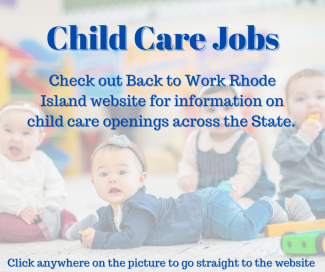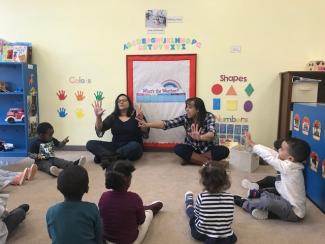
The Rhode Island Department of Human Services Office of Child Care is committed to ensuring that all children have a healthy, safe, and high-quality experience in licensed RI Child Care Programs. Ensuring a highly qualified early care and education workforce is key to ensuring families are able to thrive at home, at work, and in the community.
To augment the quality of education delivered to our youngest learners, the Office of Child Care (DHS OCC) funds a number of quality initiatives. Individuals employed in a DHS licensed, BrightStars rated program may be eligible for a full or 90% scholarship to advance their career by beginning or continuing higher education and training opportunities.
In partnership with Rhode Island public institutions of higher education, the DHS OCC funds and supports in the development, delivery and oversight of a number of workforce development pathways. DHS Workforce Development pathways are high-quality, equitable, accessible, and affordable for the working professional. Our pathways promote early educator competencies and the RI small bussinesses that employ them to offer the highest quality child care to support young children and their families whenever possible.
In service to the Rhode Island Early Childhood Care and Education Strategic Plan, DHS Workforce Development pathways help ensure RI child care programs can attract, develop and retain a strong workforce of qualified and well-supported educators to meet the current demand for educators. It also works to build a pipeline for future expansion. This is one of the strategies the DHS OCC is employing to ensure high-quality, inclusive, and culturally responsive early care and education for RI children and families.
To ensure prospective students, employers, and the general public have a resource detailing the DHS Workforce Development Pathways, we have created this Resource Guide here. Additional information can be found below.

DHS partners with CCRI to operate the Rhode Island Early Childhood Education and Training Program (RIECETP), one of several early care and education quality initiatives developed to increase the quality of child care providers that service families and children enrolled in the state’s Child Care Assistant Program. The RIECETP is a comprehensive and unique education and training program that strengthens the knowledge and skills of both seasoned and novice early childhood educators by providing supportive mentoring, coaching, cohort-based learning, and formal academic coursework. RIECETP offers three, free of cost, stackable pathways to achieve credentialing and/or college credits that are integral to the DHS Sponsored Professional Development & Technical Assistance (PD/TA) Early Childhood Education Workforce Development Pathways Quality Continuum:

DHS partners with the Rhode Island Association for the Educaton of Young Children (RIAEYC) to operate the innovative Teacher Educaton and Compensation Helps scholarship program (T.E.A.C.H.) Early Childhood RI. Incumbent child care workers employed in DHS-licensed CCAP programs serving children age birth-five with the support of their employer may apply to receive a scholarship to off-set the cost of earning early childhood college credits, certificates, and degrees at the Community College of RI (CCRI), Rhode Island College (RIC) and the University of Rhode Island (URI). Through T.E.A.C.H., educators advance their career by pursuing certificates and higher-education degrees in early childhood education (ECE). This scholarship opportunity is designed to embed tuition reimbursement (typically offer 90% of the cost of tuition), educator paid time off, student stipends to offset costs, and textbooks, as guaranteed wage enhancements, as agreed upon, between the educator and their employer as described in each model to meet the needs of Rhode Island’s child care workers.
In addition to overseeing T.E.A.C.H. scholarships, DHS contracts with T.E.A.C.H. to operationalize the Career and Technical Education Pathway Program. This project is designed to create a bridge from high school into early childhood education and career opportunities, by developing partnerships with TEACH counselors, DHS licensed –CCAP early childcare providers and local high school career and technical education programs with early childhood education and training options.